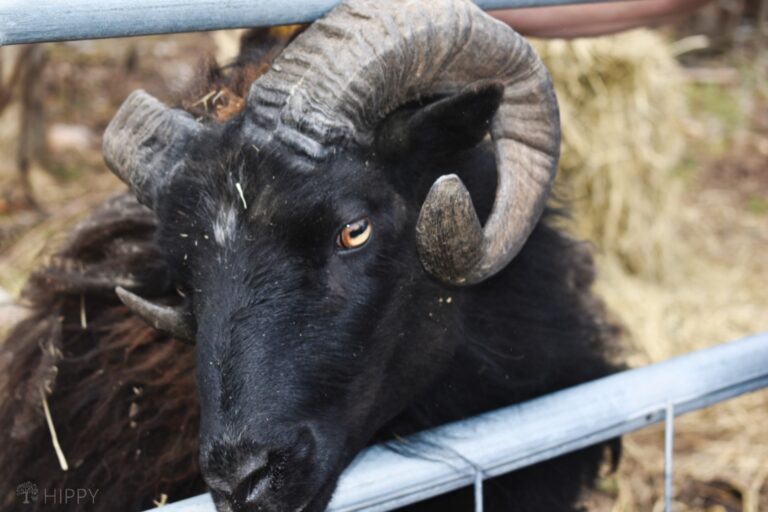Typically, when we think of sheep, we think of lamb chops and wool, and/or cartoons like Sam Sheepdog and Ralph Wolf. Occasionally, and I do mean occasionally, you’ll see a video of someone being knocked down by one of the rams.

Now, while we might get a bit of a chuckle out of it from time to time, these videos do bring up an interesting question: are sheep dangerous?
No, sheep are not usually aggressive. They typically keep their distance, and mind their own business. However, they may become aggressive when cornered, threatened, or mistreated – particularly the rams.
Rams tend to headbutt each-other in fights, and sometimes they humans as well; knocking them down. The blunt force injuries from the actual headbutt can sometimes be fatal.
Let’s take a closer look at aggression in sheep – and we will also give you some tips on how to avoid serious injuries when working with your sheep.
Different Breeds of Sheep
First off, as with all animal species, there are a few different types of sheep. Some examples include:
- Bighorn
- Dall
- Merino
- Cotswold
- Lincoln Long Wool
Merino, Cotswold, and the Lincoln Long Wool are domestic breeds raised for meat and wool respectively.
Bighorn sheep live in large herds and are named for their large horns. They are found throughout North America. Both the rams and the ewes have horns with the rams’ horns being longer and more curved than those of the ewes. These guys typically weigh in at 315 lbs. (143kg) with their horns weighing around 30 lbs. (14kg).
Dall sheep are found in Alaska and the Yukon Territory, as well as a few other places. Like Bighorn sheep, Dall sheep have horns with the rams having longer, curvier horns than the ewes.
Predators that prey on these sheep include wolves, bears, and coyotes but, and you guys are going to love this, Dall sheep are known to headbutt wolves off cliffs!
Each breed is unique in size, appearance, and interactions, and each will have a different… personality – for lack of a better word.
Sheep prefer to Keep their Distance
While the weight of these animals and, in the cases of some breeds, horns provide a significant amount of risk or threat; sheep are generally not dangerous to humans.
Sheep are cautious and will rarely attack humans, preferring instead to just keep a safe distance or, if that fails, to run – especially if they’re in the wild.
With that said, they can become defensive when cornered/mistreated which could be a very bad time for all involved. The same thing happens if you corner many other animals: you hurt them, and they’ll hurt you.
Something to keep in mind is that certain human behavior – i.e. patting their heads, scratching, rubbing, etc. – may be interpreted as a threat display and/or a challenge which may provoke an aggressive or defensive reaction.
Signs of Aggression in Sheep
Just like any other animal, sheep can exhibit signs of aggression. However, since they are prey animals, their aggression is often camouflaged.
For example, a sheep may butt another sheep with its head or ram another sheep with its body in order to assert dominance without appearing too aggressive. If you’re concerned that your sheep may be acting aggressively, here are some things to look for.
Stomping and Backing Up
This is usually a sign that a sheep is feeling threatened and wants the other sheep to back off. This behavior is often followed by backing up, which is then followed by ramming.
Horns
One of the most obvious cues that a sheep is feeling aggressive is if it lowers its head and points its horns at another animal or human. If you see this happening, it’s best to give the aggressive sheep some space.
Other cues that a sheep is feeling aggressive include baring its teeth, lunging at another animal or human, and making loud noises such as bleating loudly.
Direct Eye Contact
A lot of times, when one sheep is trying to assert dominance over another, they’ll stare them down. If you notice this happening, again, try to separate the two animals (or get away, if the eye contact is being made with you) before things escalate any further.
It’s the Rut
Once a year, most male sheep go into what’s called “the rut.” Most sheep are seasonal breeders, meaning the rut is in a pronounced period in October or November.
During this time, they become more aggressive as they compete for mates. If you have a flock of sheep, be extra vigilant during the rutting season and keep an eye out for any fights that break out.
The best way to avoid problems is to keep your rams separated from the rest of the flock during this time.
Watch out for the Rams
When interacting with sheep – either wild or domesticated – it’s always a good idea to watch out for the rams. Rams, for those who don’t know, are the males that haven’t been…erm…snipped – if he’s been snipped, the ram is called a wether.
Problems with rams will usually start when they reach puberty (go figure) and are looking to make a name for themselves as the proverbial king of the hill. They will challenge the top ram – you – for dominance over the rest of the flock.
They usually only butt heads with each other, and they rarely become aggressive with humans. That said, an aggressive ram can cause more than a few problems for your homestead.
That’s why you need to learn how to deal with an aggressive sheep. Typically, what you have to worry about is being headbutted by a ram. Now, that probably doesn’t sound like much but take it from someone who knows, it’s not a pleasant experience.
The air is pushed from your lungs, and you’re left short of breath, a bit lightheaded, and in varying degrees of pain – depending on the surrounding area where you were knocked down.
Getting knocked down onto rocks or, as in my experience, into a barbed wire fence is painful, and impacts on your chest, back, and/or head can lead to some very serious blunt-force injuries. These injuries can be, and sometimes are fatal to those who sustain them.
How to Prevent A Sheep Attack – and What to Do in the Event of Aggressive Behavior
There are steps you can take to prevent a sheep attack on your farm. And if an attack does happen, there are also things you can do to protect yourself and defuse the situation.
Make Sure Your Sheep Have a Healthy Fear of Humans
It’s important to make sure that your sheep have a healthy fear of humans. If your sheep feel comfortable around people, they’re more likely to approach humans — and that can lead to an attack, especially if they don’t view you as the dominant animal or if they wish to unseat you from your dominance.
…But Also Make Sure They Have Some Human Contact
The best way to prevent a sheep attack is by establishing a good relationship with your animals from the start.
Spend time with them every day, so they get used to your presence and begin to see you as a friend rather than a threat. When you’re around them, always move slowly and avoid making sudden movements that could startle them.
Mind Your Fences
It’s also important to keep your farm fence in good repair. This will help keep other animals—including predators—out, and will also give your sheep a sense of security. Make sure the gate is always closed when it’s not in use, so no one accidentally lets any animals out (or in).
Have an Escape Route
Despite your best efforts, there may come a time when you find yourself on the receiving end of a sheep attack. If this happens, try to remain calm and avoid running away or making any sudden movements.
Move slowly towards the fence or gate and make your way out of the enclosure as calmly as possible. Once you’re out, close the gate behind you so the sheep can’t escape.
Have an escape route so you can get away from your aggressive sheep ASAP.
Avoid Small Spaces
One of the best ways to prevent a sheep attack is to avoid small spaces. When sheep feel trapped or cornered, they can become aggressive. So, if you’re in a pasture with sheep, make sure to give them plenty of room to move around.
Put In a Barrier
Sometimes, even if you do everything right, a sheep may still become aggressive. If this happens, the best thing you can do is try to minimize the damage.
For example, if an aggressive sheep is ramming another sheep repeatedly, try to separate them by putting a barrier between them or leading the aggressor away with food.
Don’t Touch the Ram’s Head
Another way to prevent a Sheep attack is to avoid touching the ram’s head. Rams are especially territorial animals, and they will often see humans as a threat if you get too close to them.
If you must touch a ram’s head, do so with caution and be sure to pet them gently.
Prevention is Key
Of course, the best way to deal with an aggressive Sheep is to prevent aggression from happening in the first place. You can do this by keeping your flock healthy and well-nourished and by providing them with plenty of space to roam.
You should also socialize your sheep so they become used to being around humans and other animals.
Finally, be sure to handle your sheep calmly and confidently so they don’t sense any fear or uncertainty from you.
Will a Female Sheep Be Aggressive?
The answer is not as simple as a yes or no. While rams are more likely to be aggressive, female sheep can also exhibit aggressive behavior, particularly when they are around their lambs.
There are several reasons why female sheep can be aggressive. One is that they are naturally protective of their offspring. If they feel that their lambs are being threatened, they will not hesitate to defend them.
Additionally, female sheep can become aggressive if they feel that they are being threatened or if they are simply feeling territorial.
Luckily, there are several things that you can do to prevent your female sheep from becoming aggressive. One is to provide them with plenty of space. If your sheep feel cramped, it will only increase the chances of aggression.
Make sure your sheep always have a “flight zone” that allows them to escape to avoid aggressive behavior.
Avoid handling your female sheep too much. If you must handle them, do so gently and with caution. By following these simple tips, you can help ensure that your female sheep remain calm and docile.
So, the Final Verdict?
The final answer is no, sheep aren’t usually dangerous to humans.
Rams will be aggressive at times but, generally, sheep prefer to mind their own business, and keep their distance.
That said, they can become aggressive if threatened or cornered – much like any other intelligent animal.
While they might not fit the traditional image of a ‘dangerous’ animal, sheep can do some significant damage; inflicting blunt force injuries that can, in some cases, prove fatal.
That brings us to the end of this adventure! I hope you guys enjoyed the article and found it informative. As always, I’d like to say thanks for reading and I’ll see you for the next one!

Greg spent most of his childhood in camping grounds and on hiking trails. While he lives in the suburbs nowadays, Greg was raised on a small farm with chickens. He’s a decent shot with a bow, and a huge knife enthusiast. Find out more about Greg.
